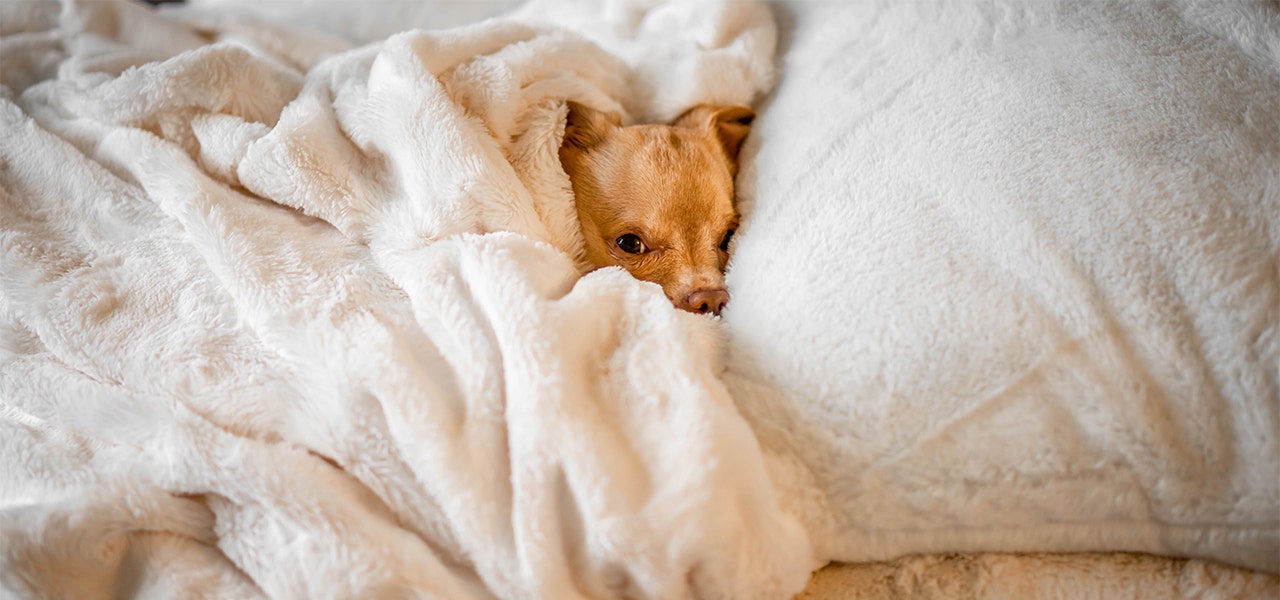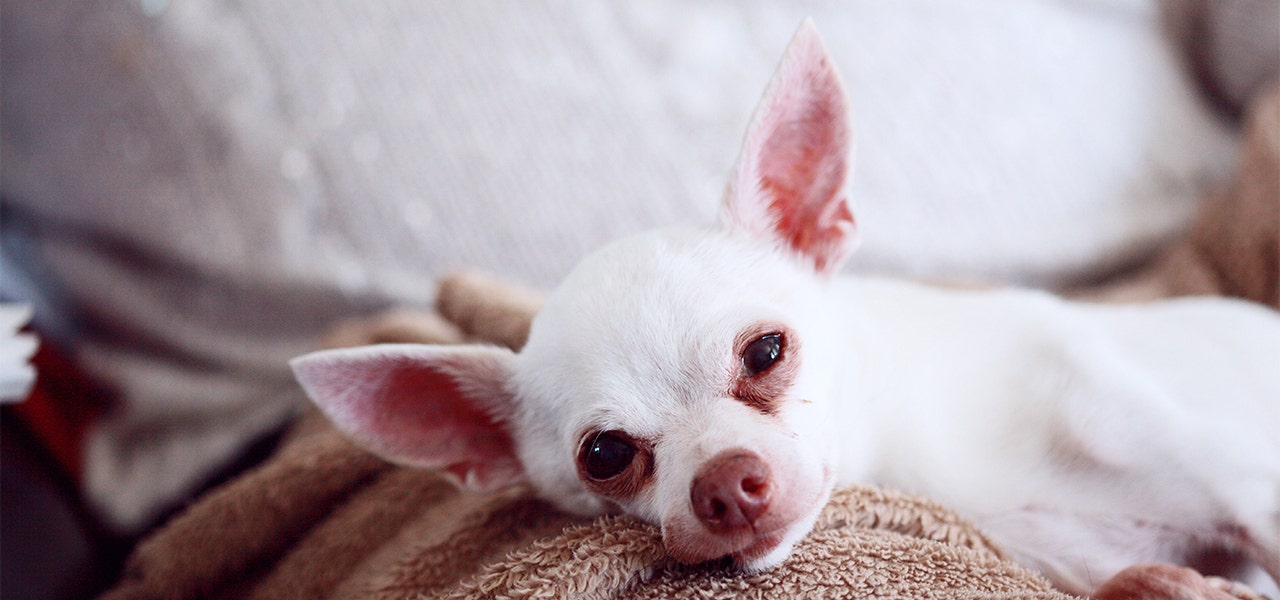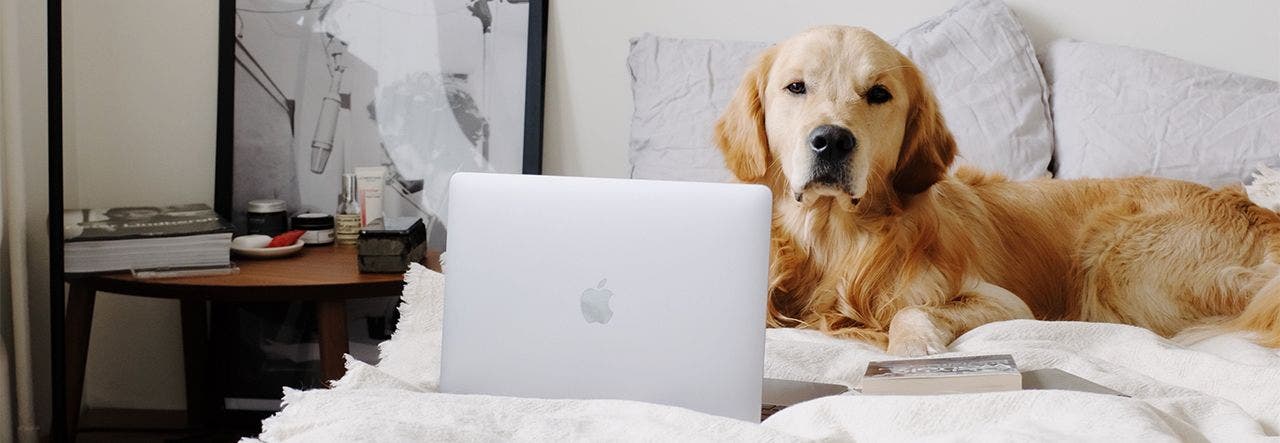As pet owners, we all want our furry companions to lead happy and healthy lives. Just like humans, dogs need their fair share of sleep to stay active, alert and full of energy. However, ensuring that your canine friend gets enough quality sleep can sometimes be a challenge.
Read on to learn the importance of sleep for dogs, signs that your pup might not be getting enough rest, reasons behind their sleep troubles and valuable tips to get your dog sleeping better. You’re sure to be thanked in puppy-dog kisses and wagging tails!
How Much Do Dogs Sleep?


Like people, a dog's sleep needs depend on the individual. Dogs have varying sleep needs depending on their age, breed and activity level. On average, adult dogs need about 12 to 14 hours of sleep per day, including both nighttime sleep and daytime naps. Puppies, on the other hand, require more sleep – up to 18 to 20 hours a day – as they are still growing and developing.
Keep in mind that larger breeds and older dogs may need more sleep to recover from physical exertion and maintain their overall health. Understanding your dog's specific needs is the first step in ensuring they get the rest they deserve. Then, you can establish a consistent sleep routine that works just for them.
Why Do Dogs Sleep So Much?
Dogs are descendants of wolves, which were naturally active during dawn and dusk. While domestication has altered their behavior to some extent, dogs still retain some of these instincts, making them crepuscular sleepers – most active at twilight.
Just like humans, ample sleep allows our pups to recharge and process the sensory input they encounter daily. Dogs are known for their excellent senses, which can be taxing on their energy levels. They are also highly active and social animals, expending a lot of energy during playtime and interactions with their human companions.
Whether they’re investigating a new scent in the yard or engaging in a rough round of tug-o-war with their person, curling up for a nap is essential for dogs to recharge after a burst of activity.
Signs Your Pup Isn't Sleeping Enough
Just like with humans, sleep deprivation can negatively impact a dog's overall well-being. Identifying sleep deprivation in dogs can sometimes be tricky, but certain signs can indicate that your pup isn't getting the rest they need. Look out for things like:
- Excessive lethargy
- Excessive barking
- Irritability
- Difficulty concentrating
- Changes in appetite
- Increased shedding


4 Reasons Your Dog Can't Sleep
If you notice any of the signs we discussed, it might be time to assess your pup’s sleep routine. Here are four potential causes to investigate if you notice your dog sleeping poorly.
1. Discomfort
Like their human counterparts, discomfort can prevent dogs from sleeping through the night. Conditions such as an inadequate bed or high room temperature can disrupt your dog's sleep. (Think of any nights you’ve spent on an uncomfortable mattress or in a hot room – it’s not fun!)
2. Health Conditions
Pain from underlying health problems or conditions like arthritis can make it difficult for dogs to find a comfortable sleeping position, too. Although they can’t describe their pain by speaking, dogs may try to share that they are uncomfortable through signs such as:
- Anxiety
- Agitation
- Whimpering or growling
- Trembling
- Restlessness
- Reduced appetite
- Lethargy
If you suspect your dog may be in pain, you should set up an appointment with your veterinarian right away – your pet can’t do it for themself!
3. Anxiety
Also like humans, dogs can experience anxiety that affects their sleep patterns. Loud noises such as fireworks or thunderstorms are a common trigger. Separation anxiety from sleeping in a different area of the house can also affect your dog’s sleep. Senior dogs can even experience nighttime separation anxiety when they’re near you, as they might view sleeping as a way of being isolated from you, per the ASPCA.
4. Lack of Routine
Dogs thrive on routine. An inconsistent sleep and wake schedule can lead to poor sleep for your pup, who won’t know when it’s time to wind down or perk up. And anyone who’s trained a puppy before knows that if your dog isn’t on a sleep schedule, your own sleep will likely suffer, too!
Lack of daily exercise can also lead to doggie sleep disturbances. The more energy your pup expends throughout the day, the better they’ll sleep at night because their brain and body truly need that restoration.
Sleep Tips for Your Dog
Your dog relies on you for, well, everything! Sometimes, that includes help getting the healthy sleep they need to run, play, explore and do whatever else doggies do. These tips will help you help them.
Create a Cozy Sleeping Environment
Provide a comfortable bed in a quiet, dark, and temperature-controlled room. (Pro tip: Naturepedic Organic Dog Beds are made with pressure-point relieving latex and soft organic cotton for your furry friend’s most comfortable sleep!)
Establish a Routine
Set a regular sleep schedule to help regulate your dog's internal clock. Try establishing your own consistent sleep/wake routine, and get them on that same schedule – you’ll both be sleeping better.
Regular Exercise
Engage your dog in stimulating activities to tire them out before bedtime. Physical exercise is always a good idea, but on rainy or busy days, mental exercise is great, too. Try using a puzzle feeder or a treat topple to get their brain working!
Mind Their Diet
Avoid feeding your pet their evening meal too close to bedtime to avoid any bathroom-related sleep disruptions (for either of you!). Take them out to use the bathroom before bed, and if you’re worried they’ll get hungry overnight, you can provide a bone or a treat late at night.
Reduce Anxiety
Calming techniques such as soothing music or aromatherapy can help alleviate anxiety-related sleep problems. Just make sure to do your research if using essential oils, as some can be toxic for pets!
Ensuring your dog gets the sleep they need is crucial for their overall well-being. By understanding their sleep requirements, recognizing signs of sleep deprivation, addressing potential causes of sleep troubles and implementing effective sleep tips, you can help your furry friend enjoy restful nights and vibrant days.
Remember, a well-rested dog is a happier and healthier dog ready to em-“bark” on new adventures by your side. For more healthy pet tips, check out this blog on why organic pet beds are better.
 BABY
BABY  KIDS
KIDS  ADULT
ADULT  LEARN
LEARN  STORES
STORES 
